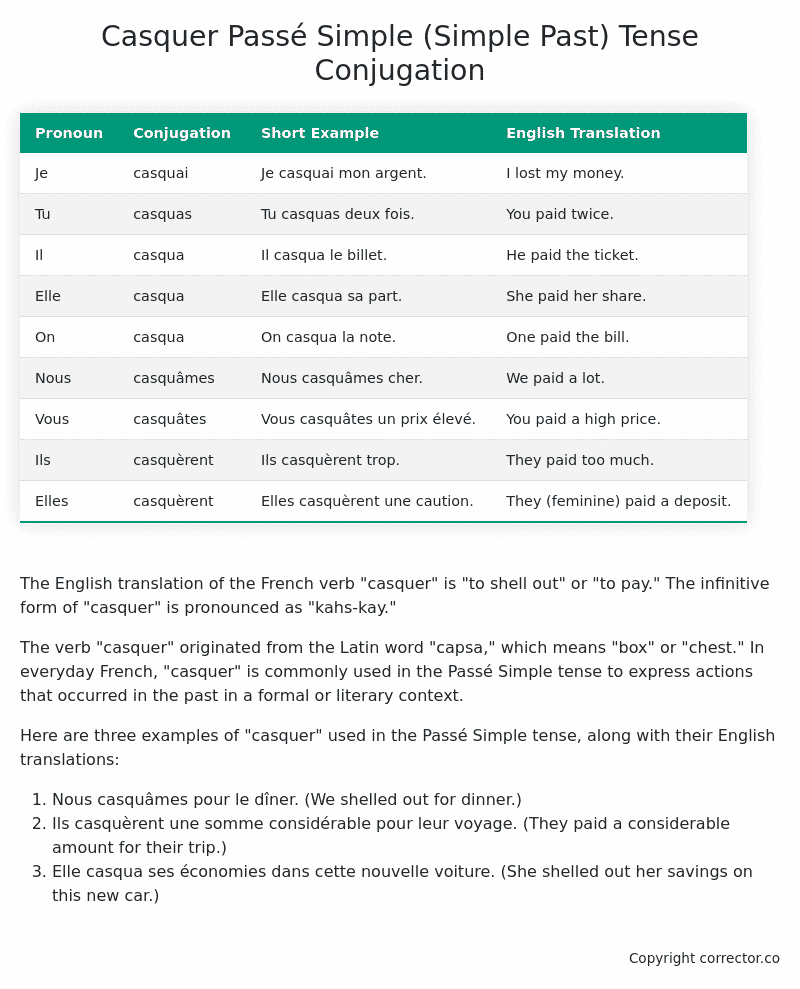Passé Simple (Simple Past) Tense Conjugation of the French Verb casquer
Introduction to the verb casquer
The English translation of the French verb “casquer” is “to shell out” or “to pay.” The infinitive form of “casquer” is pronounced as “kahs-kay.”
The verb “casquer” originated from the Latin word “capsa,” which means “box” or “chest.” In everyday French, “casquer” is commonly used in the Passé Simple tense to express actions that occurred in the past in a formal or literary context.
Here are three examples of “casquer” used in the Passé Simple tense, along with their English translations:
- Nous casquâmes pour le dîner.
(We shelled out for dinner.) - Ils casquèrent une somme considérable pour leur voyage.
(They paid a considerable amount for their trip.) - Elle casqua ses économies dans cette nouvelle voiture.
(She shelled out her savings on this new car.)
Table of the Passé Simple (Simple Past) Tense Conjugation of casquer
| Pronoun | Conjugation | Short Example | English Translation |
|---|---|---|---|
| Je | casquai | Je casquai mon argent. | I lost my money. |
| Tu | casquas | Tu casquas deux fois. | You paid twice. |
| Il | casqua | Il casqua le billet. | He paid the ticket. |
| Elle | casqua | Elle casqua sa part. | She paid her share. |
| On | casqua | On casqua la note. | One paid the bill. |
| Nous | casquâmes | Nous casquâmes cher. | We paid a lot. |
| Vous | casquâtes | Vous casquâtes un prix élevé. | You paid a high price. |
| Ils | casquèrent | Ils casquèrent trop. | They paid too much. |
| Elles | casquèrent | Elles casquèrent une caution. | They (feminine) paid a deposit. |
Other Conjugations for Casquer.
Le Present (Present Tense) Conjugation of the French Verb casquer
Imparfait (Imperfect) Tense Conjugation of the French Verb casquer
Passé Simple (Simple Past) Tense Conjugation of the French Verb casquer (You’re reading it right now!)
Passé Composé (Present Perfect) Tense Conjugation of the French Verb casquer
Futur Simple (Simple Future) Tense Conjugation of the French Verb casquer
Futur Proche (Near Future) Tense Conjugation of the French Verb casquer
Plus-que-parfait (Pluperfect) Tense Conjugation of the French Verb casquer
Passé Antérieur (Past Anterior) Tense Conjugation of the French Verb casquer
Futur Antérieur (Future Anterior) Tense Conjugation of the French Verb casquer
Subjonctif Présent (Subjunctive Present) Tense Conjugation of the French Verb casquer
Subjonctif Passé (Subjunctive Past) Tense Conjugation of the French Verb casquer
Subjonctif Imparfait (Subjunctive Imperfect) Tense Conjugation of the French Verb casquer
Subjonctif Plus-que-parfait (Subjunctive Pluperfect) Tense Conjugation of the French Verb casquer
Conditionnel Présent (Conditional Present) Tense Conjugation of the French Verb casquer
Conditionnel Passé (Conditional Past) Tense Conjugation of the French Verb casquer
Conditionnel Passé II (Conditional Past II) Tense Conjugation of the French Verb casquer
L’impératif Présent (Imperative Present) Tense Conjugation of the French Verb casquer
L’impératif Passé (Imperative Past) Tense Conjugation of the French Verb casquer
L’infinitif Présent (Infinitive Present) Tense Conjugation of the French Verb casquer
L’infinitif Passé (Infinitive Past) Tense Conjugation of the French Verb casquer
Le Participe Présent (Present Participle) Tense Conjugation of the French Verb casquer
Le Participe Passé (Past Participle) Tense Conjugation of the French Verb casquer
Struggling with French verbs or the language in general? Why not use our free French Grammar Checker – no registration required!
Get a FREE Download Study Sheet of this Conjugation 🔥
Simply right click the image below, click “save image” and get your free reference for the casquer Passé Simple tense conjugation!

Casquer – About the French Passé Simple (Simple Past) Tense
Formation
Usage
Narration
Historical Context
Interactions with other tenses
Passé Composé
Imparfait
Conditional and Subjunctive
Summary
I hope you enjoyed this article on the verb casquer. Still in a learning mood? Check out another TOTALLY random French verb conjugation!


